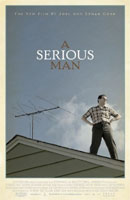The Coens are at their oddest, most inscrutable, and perhaps most elegant with A Serious Man, an exploration of mid-century Jewish identity and anxiety set within a Minneapolis suburb that quite deliberately resembles that of the Coens' childhood. Many critics are focusing on the personal nature of the film, but the Coens, who aren't devout Jews by any means, seem to once again be picking a specific area of American culture-- like Washington in Burn After Reading or the Southwest in several of their other films-- and skewering it to death. This time it just happens to hit a bit closer to home.
The inscrutable part is most evident in the opening scene, a parable entirely in Yiddish, about a wife who invites over for dinner a man who may or may not be a ghost. The parable's relation to the main story is tenuous, but nicely introduces a world in which faith can double as myth, and people don't so much take comfort in their faith as fear its wrath. Soon after we meet economics professor Larry Gopnik (Michael Stuhlbarg), a classic mensch trying only to do good by his family, his colleagues and his students. Being that the film's world is the precisely the 1967 Jewish suburbia that the Coens remember from childhood, it is exquisitely detailed, from the everpresent Jefferson Airplane song "Somebody to Love" to quietly hilarious names like Ron Meshbesher and a school bully named Fagle.
Things start unraveling for Larry all at once, with his wife (Sarri Lennick) leaving him for unctuous neighbor Sy Abelman (Fred Melamed), his eccentric-bordering-on-crazy brother Arthur (Richard Kind), who has been living on the couch the last few months, running into trouble with the cops, and a Korean student (David Kang) offering a bribe in exchange for a better grade, with his father insisting the bribe is simply a cultural difference between them. Larry, who has always prided himself on doing what's right, finds himself at a complete loss, and failed visits to a series of rabbis provide no help. More than anything Larry is heard asking other characters "What's going on?" and the advice he gets most often is to stop asking questions-- "Accept the mystery," in the words of one character.
As with many Coen movies, things are going nowhere good, but there's a delicious, black joy in seeing how they get there, with Larry pushed and pulled in every direction, by the end left with only his dignity intact, and that quickly slipping away too. Stuhlbarg is marvelous in the lead role, playing a sad sack who runs right up to the line of pathetic, but whom you could also believe the neighborhood sexpot (Amy Landecker) might want to take under her wing. He's aided by a tremendous supporting cast, ranging from the somewhat well-known Kind to a bevy of local Minneapolis child actors, who capture the constant indignity and desperate grasps at freedom that surely marked the Coens' own childhood-- as well as everyone else's.
Unlike their previous two movies, which seemed to target an illness at the heart of all of America, A Serious Man feels somewhat small, a drilldown into a specific man at a specific time, whose troubles are relatable but not all that meaningful on a larger level. But a broader scope probably would have killed A Serious Man, which thrives on small plays on language and character, and more than anything a specific Jewish world, both as a culture and as a religion that seemingly demands everything from its congregations and offers nothing in return.
I'm positive a second viewing of the film would offer twice as much to enjoy than the first go round, simply for all the repeated motifs and lines, for watching the machinery of how Larry's life comes crashing down. But even on a first viewing, even seen as entertainment and nothing more, A Serious Man is a black comedy that misses despair by about an inch, using the old Coen magic of entertaining an audience through sadism and only occasionally letting us feel bad for it. Like virtually everything else the Coens have ever made, it's an odd little gem.
Staff Writer at CinemaBlend












